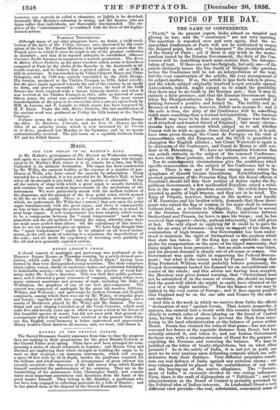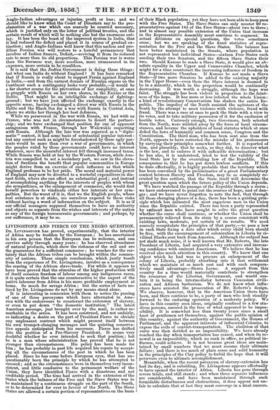TOPICS OF THE DAY.
THE GAME OF CONFERENCES.
" PEACE," in its present aspect, looks almost as tangled an gloomy as war, and the " assurances " are not very assuring. The assertion is repeated over and over again that the re. assembled Conference at Paris will not be authorized to reopen the Bolgrad point, but only " to interpret " the twentieth article of the treaty of Paris ; yet if there is any truth in the memo- randum issued by the Russian Government, the duty of the Con- ference will be something much more serious than the interpre- tation of text. If there are not two Bolgrads, but only one—if the article distinctly traces the line South of l3olgrad—the question before the Conference will be not an interpretation of the tent, but the very construction of the article, the very arrangement of its subject-matter. If so, the article is ipso facto taken to pieces, and the whole subject originally involved is now actually opened. Antecedents, indeed, might compel us to admit the possibility that there may be no truth in the Russian note' that it may he entirely, a false pretence, and that the Russian Government may, when the Plenipotentiaries take their seats, • be convicted of putting forward a positive and formal lie. The futility and in- decency of such a course, however, forbid us to assume it; and if the note is true, the duty of the Conference will be something ranch more searching than a textual interpretation. The business of karch may have to be done over again. France was then the most attached and trusted friend of England ; but many eircum- staneas have since occurred which compel us to ask whether France will be with us again. Sonic kind of assurances, it is said, have bean given through the Count de Persigny on his visit of remonstrance with the Emperor, and the &Week is permitted to champion the English alliance ; but Count Walewski is again to be chairman of the Conference, and Count de Morny is still resi- dent at St. Petersburg. We have no information whatever that can satisfy curiosity on the subject of the renewed Conference; we have only these portents, and the portents are not promising. Nor do contemporary circumstances give the confidence which specific reassuranaes on the subject of the Conference fail to in- spire. There is tone spot of Europe among many where the symptoms of discord become threatening. Notwithstanding the avowed permission of the Prussian King that the Royal officers of Neuchitel should fall into their routine of duties under the Re- publican Government, a few madheaded Royalists raised a rebel- lion in the name of its quondam suzerain ; the rebels have been arrested as guilty of high treason and they are to be tried. The King of Prussia, however, looking to the motives and loyalty of M. Pourtales and his brother rebels, demands that those insur- gents who raised the flag of treason in his name shall be released without trial, as a tribute to his dignity. He applied to several of the German Governments whose states intervene between Switzerland and Prussia, for leave to pass his troops ; and he has received that support—slowly, perhaps reluctantly, but still given at last. The only object in applying for it cOuld be to pave the way for an army of invasion—an army in support of his claim for condonation of high treason. Our Government has been under- stood to maintain the right of Switzerland in the position which that state has taken. If the King has any equitable claim to prefer for compensation on the score of his lapsed suzerainty, that claim might have been presented ; but no such course was taken and his present demand is clearly out of all sense or reason. Ou; Government was lpith right in supporting the Federal Govern- meat; but what is the course taken by France ? Hinting that King Frederick William would probably behave generously, the French Government backed his demand for an unconditional sur- render of the rebels ; and this advice not having been accepted, the Moniteur now 6nves formal warning, that 4‘ Switzerland must not be astonished if, in the course of events, she should no longer find the good-will which she might so easily have obtained at the cost of a very slight sacrifice.' Thus the flames of war may be lighted in the very centre of Europe ; and it does appear possible that England may be on the one aide and France by the side of our enemies.
And this is the week in which we receive from India the official "declaration of war" against Persia. That Asiatic monarchy, it appears, has entered into a treaty with this country binding itself closely to certain rules of chess-playing on the board of Central Asia, having for their purpose to prevent the Shah from inter- fering in the local administration or the balance of power within Herat. Persia has violated the rules of that game—has not man- oeuvered her forces at the requisite distance from Herat, but has actually entered it, and taken it; and our Indian Government declares war, with a counter-invasion of Herat for the purpose of expelling the Persians and restoring the balance. We may be justified on the letter of treaty-stipubitinns, but on what other grounds ? As to the safety of India, it is not yet in peril, nor need we be very anxious upon defending outposts which are self- defensive from their distance. Very 'different principles consti- tute our real defence of India against any external enemy ; our true reliance should be placed in the consolidation of our rule, and the buying-up of the native allegiance. The " Govern- ment of India" is curiously divided by two ruling influences. First, there is the craft of diplomatists or " Politicals" ; and our administration at the Board of Control is probably governed by the Political idea of Indian interests. In Leadenball Street a very different view prevails—the real, substantial, economical sense of
Anglo-Indian advantages or injuries, profit or loss ; and we should like to know what the Court of Directors say to the pro- clamation of a war which can scarcely be counted necessary, which is justified only on the letter of political treaties, and the certain result of which will be nothing else but the enormous out- lay. It has been the boast of the improved System in India, that it had reduced the deficit and placed it in course of gradual ex- tinction; and Anglo-Indians well know that this useless and pro- fitless Persian war will restore to a hateful permanency that iambus of Indian finance, Deficit,—reviving it from its reduced rate to more than its old proportions. This Persian war is worse than the Burmese war, more needless, more unmeasured in its expenses, more certain to be resultless.
It is said that the Indian Government is doing these things : but what can India do without England?. It has been remarked that if Russia is really about to support Persia against England in India,—and from the earnest denials of Russian organs on the Continent such a contingency looks very probable —it would be a far shorter course for the prevention of her complicity, at once to grapple with Russia on her own shores, in the Euxine or the Baltic. That might be an intelligible exchange of fighting- ground ; but we have just effected the exchange exactly in the opposite sense, having exchanged a direct war with Russia in the Baltic and the Black Sea for a war with Russia in Central Asia, where we strike her through her best defences. While we persevered in the war with Russia, we had with us France, who was not in circumstances to desert the partner- ship; and we have exchanged that position for one of apparent antagonism with France, through her Walewskis coquetting with Russia. Although the' late war was aspersed as a ' diplo- matic " contest, it had some basis of substantial popular interest : but any contest such as might be foreshadowed by these ugly por-
tents would be more than i ever a war of governments, n which the peoples ruled by those governments couldd have no interest whatever, save the mournful interest felt through increased taxes. While Russia was held at bay by the Western Powers, while Aus- tria was compelled to act a secondary part, we saw in the eleva- tion of Sardinia the benefit that popular communities in Europe might derive from an exercise of such influence as that which England professes to be her pride. The moral and Material power of Englamd may now be diverted to a wasteful expenditure in dis- tant fields, where she can effect no substantial good ; and instead of accomplishing anything for the interests of peoples with whom she sympathizes, or the enlargement of commerce, she would find herself powerless to vindicate either her interests or her sym- pathies. But the worst of it is, that we the Fnglish people, whose real substance is at stake, see ourselves exposed to these risks without having a word of information on the subject. It is as if our official managers supposed themselves to have an authority and objects as separate from the wishes and interests of the nation is any of the foreign bureaucratic governments ; and perhaps, by our sufferance, it may be so.

































 Previous page
Previous page